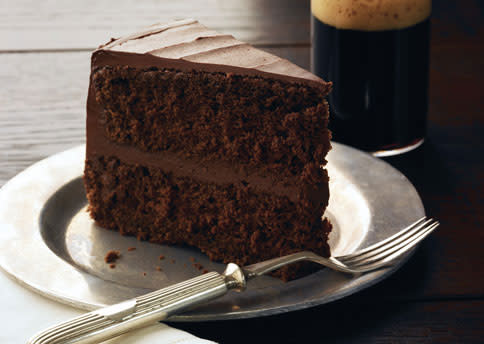Why Your Diet Is Hard to Keep (and 5 Recipes to Help)

A study out of Stanford University
seems to prove what my office vending machine has known for years: that people are more likely to give into temptations--like fattening food--when their brain is hard at work on other tasks.
(The details of the study hold more credibility than a machine that often refuses to drop a package of Pop-Tarts for $1.25, so read on.)
Stanford University professor Baba Shiv divided several dozen undergraduates into two groups. One group was asked to remember a two-digit number, the other group was asked to remember a seven-digit number. Then each person had to walk down the hall to another room, all the while remembering their number. Along the way, they were interrupted and offered a snack, either a slice of chocolate cake or a bowl of fruit salad.
Here's the crazy part: The people with two digits in their head almost always chose fruit. Those trying to remember seven digits almost always chose cake. The seven-digit students were more than twice as likely to choose the cake.
The reason, according to experts, is that the part of our brain responsible for willpower--the "prefrontal cortex"--also controls our short-term memory, as well as our ability to focus and solve abstract problems. When the brain is taxed by any one of those duties, it is less effective at the others.
That is to say, our willpower is a limited resource--like a muscle, it can give out. What's more, this study shows that our willpower muscle isn't exactly Vin Diesel's biceps or Jersey Shore's "Situation." Five digits was all it took to throw more than half of most people's willpower off course.
So, the more time you've spent, say, studying, the more likely you are to agree to visit In 'N Out burger (and order everything but the milk shake animal style). Other studies on willpower indicate that the inverse is also true: Resisting dessert at a restaurant will make it harder to prepare for an exam or a presentation later that night. Other activities that deplete your willpower reserve (and, therefore, your ability to diet) include suppressing emotional responses, restraining aggressive or sexual impulses, or trying to impress someone.
The good news is that knowing this information lets you strategize:
1. Eat right. Studies have shown that willpower actually depletes glucose. So foods that persistently elevate your blood sugar can restore your resolve. Eat meals full of protein and complex carbohydrates like beans, spinach, and whole grains (see recipes below).
2. Know your limits. Food that tempt you will exhaust your brainpower, so don't keep them around the house. And while preparing for a big exam or a work presentation, don't go out to a delicious restaurant and order "just a salad." That will burn your willpower and your focus.
3. Keep it simple. You can strengthen the prefrontal cortex--increasing your willpower--the same way you strengthen any muscle: practice. But don't set too many goals at once. Focus on a maximum of one or two goals at a time--like "I will eat more whole grains" or "I will eat more vegetables."
Above all else, it's comforting to think that understanding the limitations of our brains--as ironic as it may seem--actually helps us overcome them. Seems the jig is up, vending machine. At least until my next deadline.
Five Recipes to Improve Your Willpower
Lentil Soup with Spicy Italian Sausage
Caraway Chicken Breasts with Sweet-and-Sour Red Cabbage
Quinoa with Black Beans and Cilantro
Roasted Broccoli with Raisin Vinaigrette
Balsamic-Glazed Salmon with Spinach, Olives, and Golden Raisins
Related:
More from Bon Appétit:
